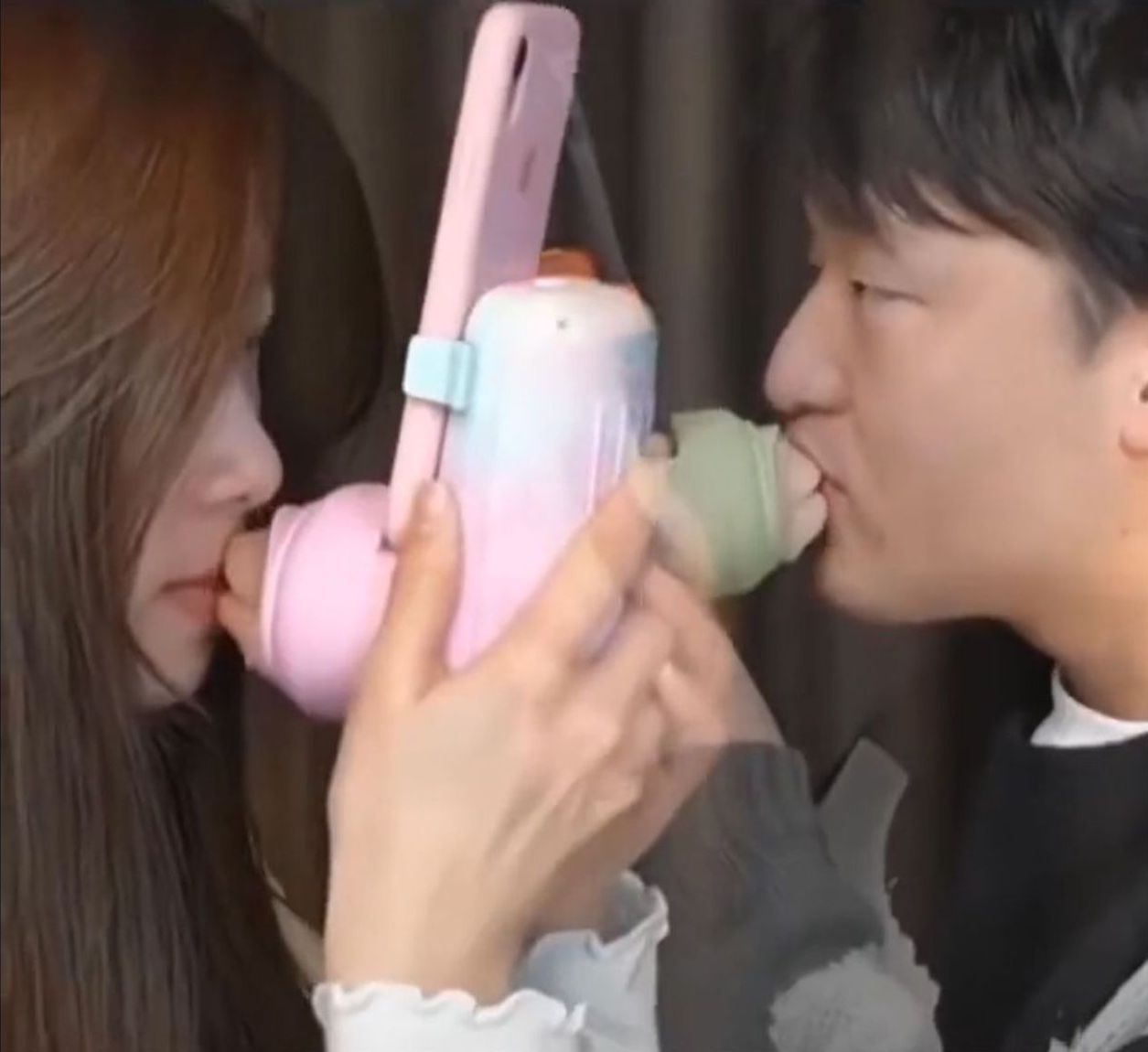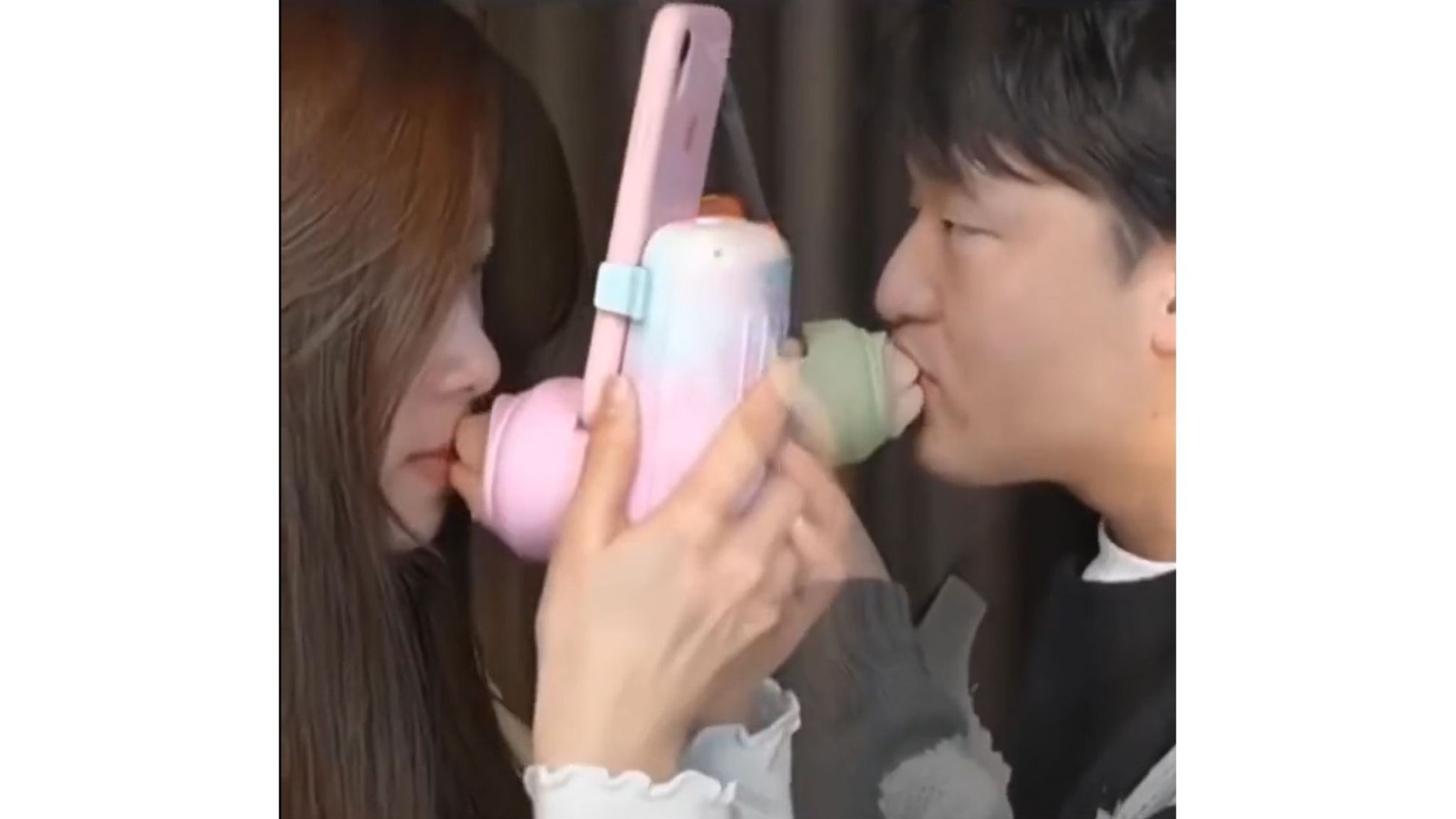Do you hate sleeping? Good! Let me tell you about these atomised silicone lips that help you kiss someone who isn’t there.
Designed to facilitate ‘physical contact’ between long-distance couples, Chinese scientist Jiang Zhongli pioneered the lips, who reportedly got the idea while dating his now ex-girlfriend. ‘We only had contact with each other through the phone. That’s where the inspiration of this device originated,’ Zhongli told the Global Times; whether or not his announcement, “hi honey, I made you some robo-lips!” was the final straw in their relationship remains unclear.
Horrifyingly, Zhongli’s device not only simulates the movement and pressure of one user’s kiss for another but also claims to replicate the temperature of their lips. Plugging into the charging port of a phone and selling for the equivalent of £34 each (£65 for a pair), user reviews on the shopping site Taobao are mixed; the device’s tongueless-ness, a blessing or a curse depending on your perspective. Personally, I’d rather eat my own eyes than make out with a robot – but is my squeamishness warranted? For that matter, is this kissing machine even particularly outlandish when it comes to the intersection of sex and tech?

The device mimics the movement, temperature and pressure of the kiss using sensors. Pic: Twitter: @tongbingxue
Take realistic, customisable sex dolls – they’ve only become possible recently. Still, we know that people have fantasised about designing an effigy of their ideal partner, at least since Pygmalion sculpted Galatea from ivory in ancient Greece. And while you might feel squicky about a silicone girlfriend, I predict you’d be less put out by the idea of a silicone dildo. If not, you’re decidedly behind the times – the earliest such sex toys identified by archaeologists date back 28,000 years, and it’s fair to assume that plenty more would have been discovered if they weren’t made of biodegradable wood.
READ MORE: Gen Z Slang | The secret code of a complicated generation
Humans have been using technology – carpentry (don’t think about the splinters) or animatronics – to bridge gaps between bodies for, um, ever. As such, this kissing bot is nothing new; it’s arguably part of a field of research termed ‘teledildonics’ per Howard Rheingold’s 1991 book Virtual Reality. In it, Rheingold describes networked technology that extends human sexual encounters beyond their immediate surroundings, often using devices controlled remotely by a partner.
Like Zhongli’s device, Rheingold’s teledildonics goes beyond the straightforward – purely functional – purview of traditional sex toys, translating individual movements into electronic information and back again. Arguably, the whole point of Zhongli’s robot is that it transmits personal idiosyncrasies rather than sterile, predictable perfection – though without almost preternatural sensitivity, it’s hard to imagine those quirks being tantalising rather than highly weird for the human half of the kiss.
Look, I haven’t tried the kissing robot. Maybe I just should get one and see where I land – but from where I’m sitting right now, robo-kiss-less, Zhongli’s invention seems like an uncomfortable
combination of chaste and explicit. For even the most heart-sore of couples, surely the device would feel more like a parody of their lover than a satisfying replacement – for all the specificity of the temperature and pressure, don’t they mind that every model’s lips are the same shape? That each one has the same non-smell, the same breath-less incorrigibility?
Perhaps we have our answer, or at least mine, to the latest sex tech. Regarding straightforward function – dildo or rubber girlfriend as the case may be – most sex toys are tools like any other: more or less useful and part of what it means to be human. When they come to stand in for individuals, moving like people rather than machines, the ever-narrowing gap between digital and organic life comes to feel unsurpassable wide. Who’d have thought a plug-in robot mouth could get us somewhere so profound? Humans are strange, unaccountable, and inimitable – but as anyone who’s ever been in love (a la Zhongli’s clientele) will know, that’s what we like about them.





